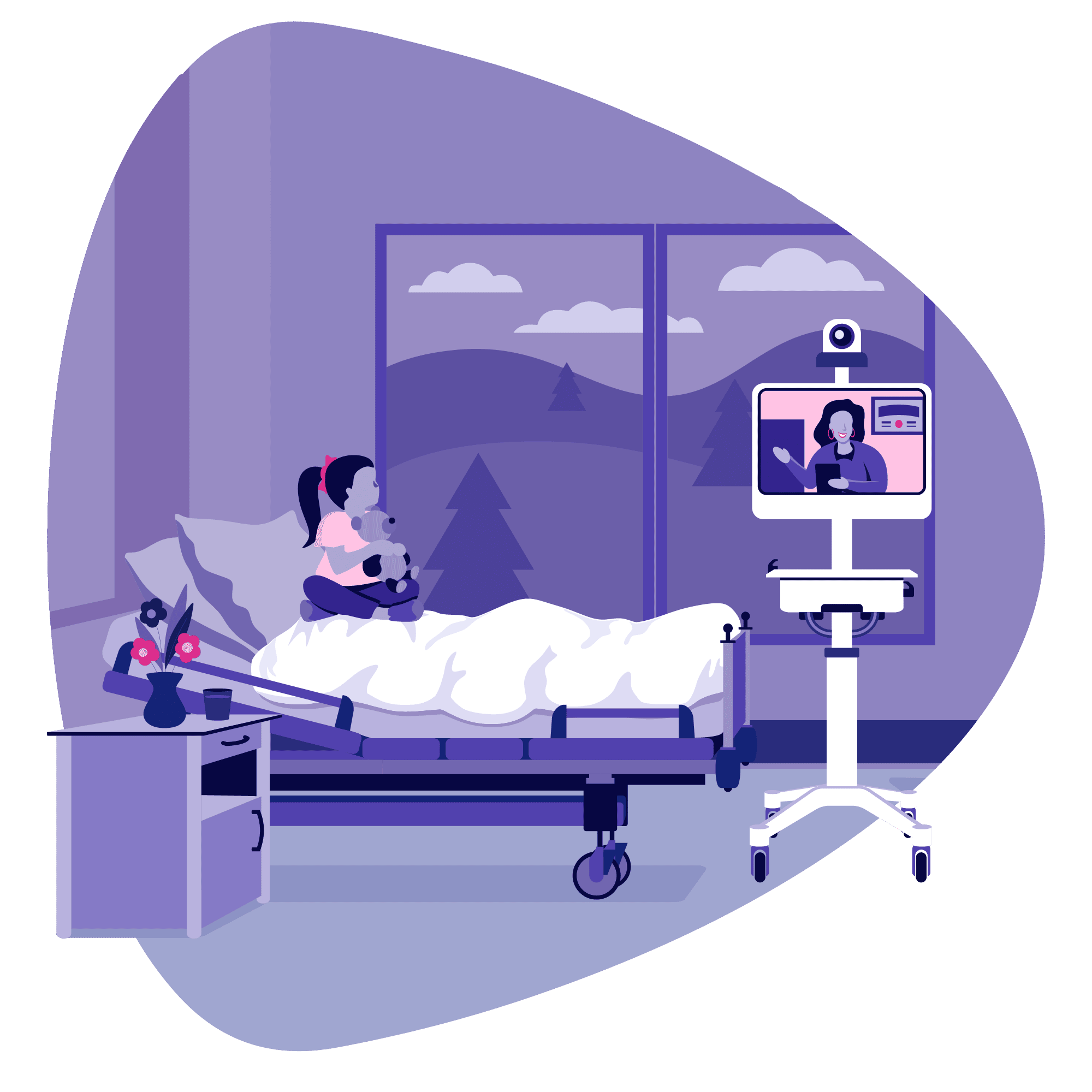Iris clinicians are at the heart of what makes our organization such a special place to work. That’s why we’re turning the spotlight on the amazing work they’re doing every day. This month, we’re sitting down to talk to our very own Medical Director of Outpatient Services Dr. Tracy Mullare.
Q. How did you find Iris and decide you wanted to be an Iris provider?
A: My path to Iris was led by some grand rounds on telepsychiatry during my training that talked about provider and patient satisfaction. That planted the seed about telepsychiatry for me. I had a previous position many years ago where we did some telehealth work for satellite locations, which was very limited. I thought there was such an opportunity to improve that approach. It helped me see how telepsychiatry promoted access to care for patients that otherwise wouldn’t be able to see a provider.
I was also commuting over three hours a day and had a young child at home. I was thinking about what I could do to improve my quality of life while still engaging in the work I love to do alongside fabulous colleagues. I started to research and found Iris Telehealth. From the first conversation I had with the Iris team, I was impressed by the consistent commitment to delivering quality, patient-first care. You hear about that commitment all the time at Iris, and that’s been consistent since my first day here.
Q. What did your entry into Iris Telehealth look like?
A: I’m a child psychiatrist. That’s my passion. I started my work with Iris as a provider at an adolescent residential center. It was a long-term residential unit for children and adolescents experiencing trauma.
My days there usually started with checking emails and schedules. Then, there would be multidisciplinary team meetings involving outpatient clinicians, family, and parole officers (if they were in place). We would have several of those at the front end of the morning, an hour each, to round on the kids. Then, it would be followed by rounding individually on different patients that were at the residential unit.
Interwoven into that, all of us would be the documentation and collateral contacts. We were also on-call into the evening if acute situations arose for nursing. Still, the staff was so adept at handling crises that they would not reach out to me very often – a credit to them for handling acuity in the unit.
Q. How has your role evolved at Iris?
A: My role has evolved tremendously. Right before the COVID-19 pandemic, I transitioned to the medical director role I have now.
The best part of my day is talking with providers. It’s been humbling to talk to folks across the country, particularly during the pandemic, to understand how it has affected the providers, patients, and communities.
To understand how everyone has addressed the need for continuity of care amidst changes when there have been lockdowns. It’s been an honor to connect with our providers and talk with them about their lives during the last couple of years; as things have evolved, behavioral health needs have increased, and how the intensity of patients’ needs has increased.
It’s also fun meeting with different clinical organizations that need great providers. We get to learn what they’re about and what their needs are. I know I speak for many of us on the team here that it’s so nice to be a part of things where we are contributing to the issue of access and really trying to move that forward. We hear time and time again stories from the clinic about how our providers are impacting their patients’ lives on a daily basis.
Q. What are the benefits of being a telepsychiatry provider?
A: At Iris, you always have an additional support system. You’re not only connected with your clinical setting, but you also have your Iris support teams that run parallel, like clinical operations managers (COMs) and additional IT support. There are measures in place that provide another level of support throughout the day, so providers never feel like they don’t have resources in place. You don’t feel isolated, which can happen when you do telepsych work.
I think another huge benefit of being a telepsych provider is that you can reach those rural areas that are so in need. You can reach underserved areas where they don’t have enough providers. Being a small part of the answer to the access to care issue is really wonderful.
Q. How can telepsychiatry providers foster connection with patients virtually?
A: First, meet the patient where they’re at, and ask how they feel about telepsychiatry. Acknowledging, “this could be weird,” or asking, “are you used to this?” or “Do you prefer it?” It’s just about understanding where the patient is with the experience and checking in with them. I think in the beginning, set the groundwork. Our clinics generally do a great job with expectations: the parameters for a telepsychiatry appointment, the confidentiality, they need to be in a secure location, how to connect, and the backup plan if connection is lost. The preparation helps it go well.
It’s helpful to continue checking in with patients to see how they feel about telepsychiatry. Many younger folks are so used to technology and take to it quickly. But some others may have more questions about it and want to make sure there’s no one else in the room. You just don’t know what people are thinking. It pays to check in with them and make sure they’re comfortable.
Q. As a healthcare professional, how do you manage work-life balance?
A: I think it’s a constant assessment and we all strive to achieve that work-life balance. I think what has helped me was eliminating my commute of three hours a day. I really had to look at my time, my values, and how I could work smarter. Telepsychiatry was the answer because I could be present for a longer length of time, which is a pleasure. I think that’s been helpful. The time management that telepsychiatry has afforded me has greatly improved my quality of life.
Q. What are your biggest learnings from your time at Iris?
A: One of my biggest learnings was more of an observation because I can’t say I was surprised. I learned how many people are consistently committed to ensuring every patient visit happens, whether that be the provider, the clinic’s team, the clinic’s admin, Iris sales, or all the COMs.
Everyone is working so hard to make sure those patient encounters happen. And, during quarantines and lockdowns, they happened without interruption. It’s been a humbling learning curve to observe that machine and motion of everyone’s consistent passion for making sure folks get the care they need.
Q. What is the most rewarding part of your job?
A: There are so many. I think at the end of the day it’s being a part of a team that is so aligned. We work hard because people need quality care and people are working exhaustively to make sure it happens. I think just being part of a team that helps ensure we have partnerships and relationships with clinics and have the right providers in the right place. I think that’s the most satisfying – knowing those patients are getting the care they need.
Q. What do you love about working with Iris?
A: I love the culture at Iris. I think it’s really fun. There’s so much enthusiasm and passion for what we do. Of course, there’s always been such a great behavioral health need, but there’s been such a demand. I love that I get to be part of a crowd whose passion it is to do this work, everyone has a commitment to doing it, and it’s just a really fun place to be.
Q. Why do you think telepsychiatry is important to the future of mental healthcare?
A: I think it’s so important to the future of mental healthcare. The pandemic has really forced the need for telepsychiatry. When patients can commit to the clinics, even those that were doing telepsychiatry within the clinics, it was the only way to continue to deliver care. Patients like it and providers enjoy it. Outcomes studies show it’s effective. There is an ease about it for providers. It brings an enhanced pool of providers to different areas of the country where they wouldn’t have specialists.
At Iris, we believe our providers should be respected, valued, and applauded for the work they do, and we couldn’t be more proud to say, “thank you” to our very own Tracy Mullare! If you’d like to learn more about working for Iris Telehealth, contact us today.


